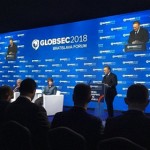The GLOBSEC Bratislava Forum has become the premier conference for the Visegrád Group or V4 countries – Slovakia, the Czech Republic, Poland and Hungary – to discuss issues related to European security.
The 2018 edition, convened by the GLOBSEC Policy Institute and Slovak Ministry of Foreign and European Affairs, took place against a geopolitical landscape that has changed considerably. The V4 emerged after the dissolution of the Soviet Union in 1991 and collapse of the Communist Bloc. The relative peace of the post-Soviet Union era enabled it to achieve economic and energy cooperation, boost security and become a firm component of the Western bloc, including the European Union. That this peace has run its course is evident from recent events in the Ukraine and Crimea, hostilities between Europe and Russia, Brexit, the spurt in terrorist attacks, the United States’ uncertainty about the trans-Atlantic alliance and the migration crisis. Now, Europe, and not just the V4, has become as vulnerable as it was in 1989 even as digital technology – cyber space, Artificial Intelligence (AI), blockchain and the Internet of Things, for example – has fundamentally transformed the global defence and security canvas.
This year, technology took precedence over defence, security and geopolitics, that have been the Bratislava Forum’s perennial priorities. Slovak President Andrej Kiska set the tone for the discussions when he said, “Our security is not only about the troops we are able to deploy or the tanks we have. In the world we live in, leadership in cutting-edge technologies is what makes the difference in our ability to defend ourselves.”
Back-to-back discussions on the role of AI in warfare, the future of cyber space, deep web, information warfare, and cyber threats to elections, pointed to the big gap that existed between the enthusiasm for digital technology and the skillful management of digital risks. Technology has evolved, but the strategies to deal with it have remained the same over the last two decades, creating more vulnerabilities. Melissa Hathaway of Belfer Centre, Harvard University, pointed to the ‘Patch Tuesday’ rule: building technological capacities on a priority basis, but patching the vulnerabilities only later – every Tuesday – when security updates and patches are installed. This attitude needs to change to better be able to tackle cyber threats.
Experts pointed out the importance of defining these threats and identifying aspects of the cyber domain that need protection. They said it called for a multi-stakeholder approach, involving governments, industry and the research fraternity as managing cyber security risk had become a mere compliance exercise for industry with no real understanding of the threats or the need to change any security practices.
Such dialogue between government and industry – especially traditional defence industries and data analytics firms – was an additional area of emphasis. Senior military personnel spoke of how unless this happened AI’s full potential in conflict could not be realised.
Gen. Denis Mercier, Supreme Allied Commander Transformation of the NATO alliance, pointed out that much discussion on AI’s role in warfare focuses on the dimension of human intervention when machines use force, but overlook the fact that human intervention can potentially slow down processes when delivering medical help to wounded troops, for example.
Even as European leaders are addressing these technological advancements, a sense of common destiny seems to be lacking in Europe. Defence and security have always been at the core of European integration, yet the continent has found it difficult to achieve strong cooperation on this front. There has been some progress: last year, the EU launched Permanent Structured Cooperation (PESCO) which allows for combined procurement of defence equipment and joint military operations. How meaningful this initiative will be remains to be seen, particularly as none of the current EU member states (barring the UK), have a power projection capability outside the continent.
China and its Belt and Road Initiative investments did not figure prominently in the forum discussions. But some speakers dwelt on China’s investments in AI. Gen. John Allen, President, Brookings Institution, put it well when he said China is investing substantially in AI, and if the U.S. does not act, it will lose its edge.
The GLOBSEC Bratislava 2018 Forum was a good opportunity to get a general view of the current thinking on defence and security in Central Europe. A snap poll taken at one of the sessions on “What is the greatest challenge for Europe?” yielded interesting results: migration came first, followed by Russia, terrorism, cyber attacks and President Trump.
Sameer Patil is Fellow, National Security Studies and Director, Center for International Security, Gateway House.
This blog is based on discussions at the GLOBSEC Conference, held mid-May 2018. For more details on the event click here.
This blog was exclusively written for Gateway House: Indian Council on Global Relations. You can read more exclusive content here.
For interview requests with the author, or for permission to republish, please contact outreach@gatewayhouse.in.
© Copyright 2018 Gateway House: Indian Council on Global Relations. All rights reserved. Any unauthorized copying or reproduction is strictly prohibited.


